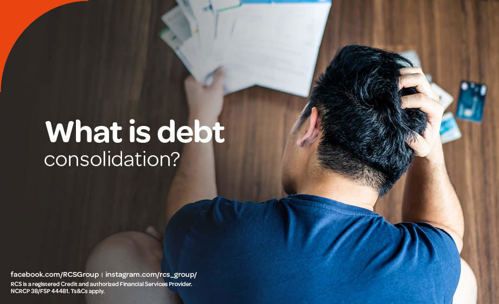What Is Debt Consolidation?
10 AUGUST 2023
Often when we hear “consolidation” we want to run for the hills. This blog will explain why consolidating one’s debt isn't always like encountering the boogeyman.
Let’s talk Debt Consolidation
Perhaps you find yourself in a position where you are paying off a few different loans every month. These loans probably come with various terms of repayments and leave you with very little money after you’ve paid them.
The act of taking out a new loan to pay off other liabilities and personal debts is known as debt consolidation. So the lender will lump up all those different debts into a single, bigger loan, with more advantageous repayment terms, such as a reduced interest rate, a lower monthly payment, or both. Student loan debt, credit card debt, and other liabilities can all be included in this lump sum, called debt consolidation. You will then be liable for paying off one amount, with one set of admin fees, rather than several payment plans that each come with their own set of fees.
Who’s this for?
For many people, a debt consolidation loan is the first step in the process of resolving their financial difficulties. For those who have an excellent relationship and payment history with their banks, this is a fantastic place to begin. If you've been turned down, you might want to look into private mortgage lenders.
Creditors are willing to offer consolidation loans for a variety of reasons. Debt consolidation increases the likelihood of collecting. Banks and credit unions typically issue these types of loans, but there are also specialized debt consolidation service companies that offer these services to the general public.
What is the difference between Debt Settlement and Debt Consolidation?
Debt settlement companies are also referred to as "debt relief" or "debt adjustment" firms. In most cases, the firms will contact your creditors on your behalf in order to negotiate a better payment plan, settle or lower your debt. They usually charge a fee, which is usually a percentage of the money saved on the resolved debt.
The company may try to work out a lump-sum payment with your creditor that is less than the whole amount you owe. They may compel you to make regular deposits into an account that is handled by a third-party while they negotiate. The debt settlement company may advise you to cease paying your creditors while they negotiate until a debt settlement agreement is achieved.
Keep in mind that there's no guarantee that the company will be able to reach agreements with all your creditors.
So in a nutshell, with debt consolidations you typically reach an agreement with a lender yourself, while with debt settlement, you typically involve a third party, who is also after making a profit.
Does debt consolidation affect your credit score?
Debt consolidation loans might damage your credit, but only for a short time. When you apply for a consolidation loan, a credit check is run, which might affect your credit score. However, in the long run, consolidating numerous accounts into a single loan might help you improve your credit score by lowering your credit usage ratio.
Making on-time payments will improve your credit score because payment history accounts for 35% of your credit score. If you just have revolving credit, such as credit cards, consolidating your debt with a personal loan can help you improve your credit mix and score.
What types of accounts can you consolidate?
In most circumstances, any debt that isn't secured by collateral can be consolidated. Even if you haven't kept up with your payments and the account has been charged off and sent to collections by the original creditor. Credit cards, shop cards, petrol cards, and unsecured personal loans can all be consolidated.
When is debt consolidation a good option for you?
Consolidating debt might be beneficial if you're left with very little money each month after paying off all of your qualified loan and credit accounts. It's a financial instrument that businesses and many financially astute individuals utilize to streamline their financial affairs, save administrative costs, and free up cash. It's especially beneficial during difficult economic times.
Requirements for debt consolidation
Borrowers must have the required income and creditworthiness to qualify, especially if they are dealing with a new lender. A letter of employment, usually a three months' bank statement is what the lender will ask from you.
If you decide to figure out your own consolidation, start with the debt with the highest interest rate. If you have a lower-interest debt that is causing you more emotional and mental stress than the higher-interest loans, for example, a personal loan that has damaged family relations, you might want to start with that one instead.



